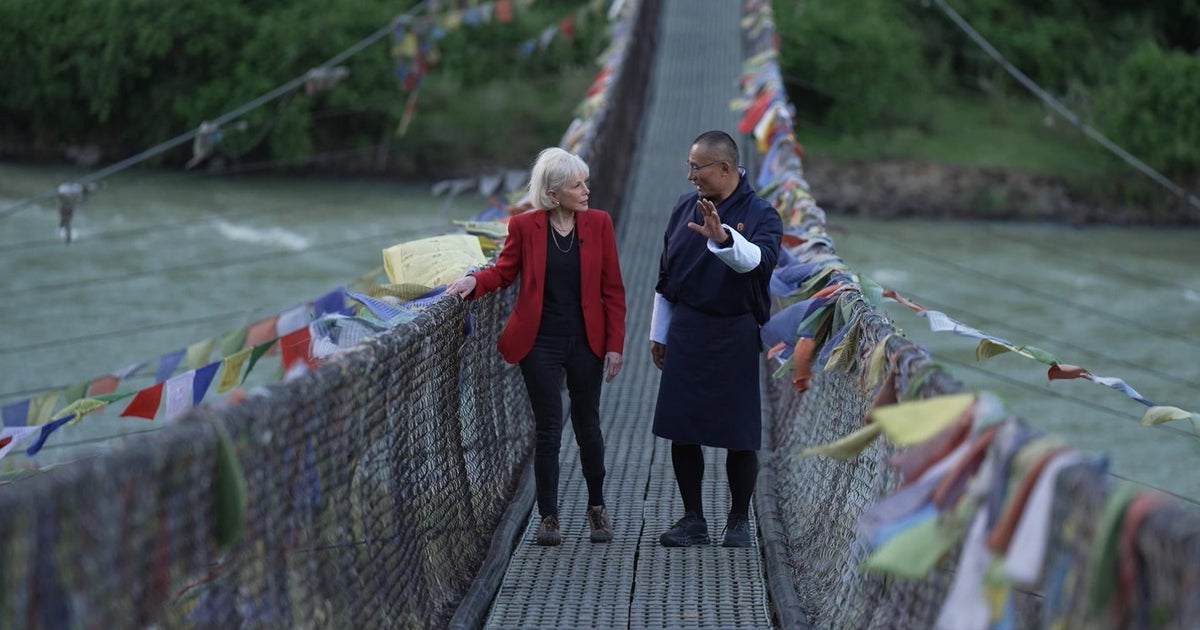Experiencing Bhutan's ancient and wondrous traditions
This week on 60 Minutes, correspondent Lesley Stahl reported from Bhutan, a small, remote country tucked away in the Himalayan mountains.
The Buddhist kingdom is known for its awe-inspiring mountains, pristine forests, beautiful temples and spirituality.
"I am not a spiritual person. But I had all kinds of emotional reactions to the beauty of Bhutan," Stahl told 60 Minutes Overtime.
"Snow-capped mountains, lush forests…it's charming, absolutely charming."
Stahl arrived at Paro International Airport on a small plane from New Delhi, landing on a runway flanked by steep mountains.
"As you look out the window, you can see yourself coming down these steep mountain slopes. It's hair raising. It's also one of the most beautiful sights ever," Stahl said.
Buddhism is the state religion in Bhutan, and it is practiced by most of its citizens.
On any given day, many people, young and old, can be seen at temples spinning prayer wheels, large cylinders made of wood, as they walk past.
Stahl spoke with Dr. Lotay Tshering, a former prime minister of Bhutan, in the center of the town of Gelephu, and he explained how the prayer wheels work.
Tshering told her they are filled with millions of written prayers, and people spin them, wishing for longevity in life or the well-being of the world.
As the wheel is turned clockwise, the devotee mentally recites a wish that they hope will come true.
"Even now, I'm making my wish," he told Stahl.
"Whatever reasons why 60 Minutes is making this…running this project, let it come to fruition. That's my prayer, wish for the day. So, yes, these are very significant in our lives."
While the team was in the country's capital, Thimphu, they saw a festival called the Thimphu Drubchen, with ceremonial dances, known as cham, that take place every year.
Masked dancers perform precisely choreographed dances to a packed audience of Bhutanese to celebrate the female deities that they believe offer them protection.
Watching from a balcony overlooking the courtyard of the Tashichho Dzong, a fortress-like monastery and administrative center where the festival is held, Stahl spoke with Prime Minister Tshering Tobgay.
"This particular ceremony in Thimphu has been going on… uninterrupted, every year, for more than 400 years," he told Stahl.
He told Stahl that while the spectacle is entertaining and enjoyable, bearing witness to it has a sacred religious purpose.
"Just by witnessing these dances…we believe that we receive blessings to protect us for a whole year."
In a grassy field in Thimphu, Stahl watched an archery match with Rabsel Dorji, who works for Bhutan's government.
Two teams of archers, using traditional bows and arrows made of bamboo, took aim at a target roughly 145 meters away, the length of a football field and a half.
"[The target] is quite far away and quite small. It's only about three feet high and... one foot wide. So, it's a difficult task," Dorji told Stahl.
Dorji explained that, depending on where the arrow hits, the team is awarded one or two points. The first team to 25 points wins a game. The team that wins the best out of three games wins the match.
But points can be deducted from a team if the opposing team hits the target afterward.
"The game can go very, very long into a whole day…or a whole two or three-day affair," Dorji said.
Stahl reacted with surprise when she saw a team singing and dancing after they hit a target.
Dorji explained that it's the equivalent of an end-zone dance. "It's a Bhutanese version of it," he said, laughing.
Stahl told Overtime that throughout her travels it was visibly apparent that Bhutan was still firmly connected to its ancient past.
"A lot of countries in the world have [become] so Westernized that they've lost their character. Here, they have kept their old traditions… they've kept their old architecture. They wear old-fashioned clothes," she said.
But Bhutan is facing an economic challenge that has made its future uncertain: young people are leaving the country for higher-paying jobs in countries like Australia.
Stahl and the 60 Minutes team were given a rare audience with the king of Bhutan, who described his plans to build a new city, the Gelephu Mindfulness City, in the country's south, near the border with India.
The king hopes the new city will provide job opportunities that will bring these young people back.
"The king's concept is that there will be a modern city, but it'll be Bhutanese. Buddhism will be at the heart of it. Clean air, clean water," she told Overtime.
The king hired renowned Danish architect Bjarke Ingels to design the new city. Ingels showed Stahl renderings for several projects, including a massive, colorful dam that will be used to generate hydroelectric power.
"And in the middle of the dam is a temple, right in the middle of the dam," Stahl said.
"You have to hope that this little country can succeed in holding on to its character, its spirituality."
The video above was produced by Will Croxton. It was edited by Sarah Shafer Prediger.



